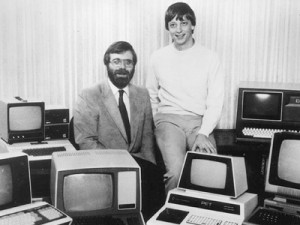For the past years, basking in the after-glow of his philanthropic efforts, one can almost spot a small radiant halo surrounding Bill Gates head. Through his, Bill & Melinda Gates Foundation, the software czar has pledged to donate half his assets to charity and is very much living up to that claim. He has already spent billions in research on AIDS, education and had pledged that he will eradicate Malaria globally. Speaking purely in corporate parlance, Bill Gates has been beatified. And his transition from a scheming, wily Billionaire to that of Saint Gates, has been truly remarkable.
But now, there is a big boulder has been hurled at that carefully crafted image by none other than one-time friend, and ex co-founder Paul Allen in his soon to be published memoir, “The Ideaman, a memoir by the co-founder of Microsoft”. Recalling those early days when the company was founded, Allen makes some damning allegations against Gates, who apparently not only cheated him of his ‘fair share’ but also was keen to upstage Allen during his weakest period in life, when he was afflicted by Hodgkin’s disease.
The not-so charitable side
The biggest grouse that Allen still holds against is his former partner at Microsoft is not surprisingly related to the way things shaped up when the company was established back in  1975. Recalling those heady days Allen touches upon his partnership with Gates when they first met at Seattle’s Lakeside School in 1968. Talking about his first impressions, Allen terms Gates as a “gangly, freckle-faced eighth-grader edging his way into the crowd around the Teletype, all arms and legs and nervous energy. He had a scruffy-preppy look: pullover sweater, tan slacks, enormous saddle shoes. His blond hair went all over the place.”
1975. Recalling those heady days Allen touches upon his partnership with Gates when they first met at Seattle’s Lakeside School in 1968. Talking about his first impressions, Allen terms Gates as a “gangly, freckle-faced eighth-grader edging his way into the crowd around the Teletype, all arms and legs and nervous energy. He had a scruffy-preppy look: pullover sweater, tan slacks, enormous saddle shoes. His blond hair went all over the place.”
It is obvious that with his skills with the Teletype (the shared computer at their school) much impressed Allen, who further states that, “You could tell three things about Bill Gates pretty quickly. He was really smart. He was really competitive; he wanted to show you how smart he was. And he was really, really persistent. After that first time, he kept coming back. Many times he and I would be the only ones there.”
Over the next few years, destiny would bring the two together and they both went on to create Micro-Soft. But once, the company was established and set, the disconnect occurred. The difference in both their personalities made them drift further and further apart. While Allen was the philosophical, do-no evil sort of technologist, Gates was the demanding maniacal boss, who would be livid at a programmer asking for a day off, after working 81 hours in 4-days. “Some said Bill’s management style was a key ingredient in Microsoft’s early success. But that made no sense to me,” he states. Continue reading
